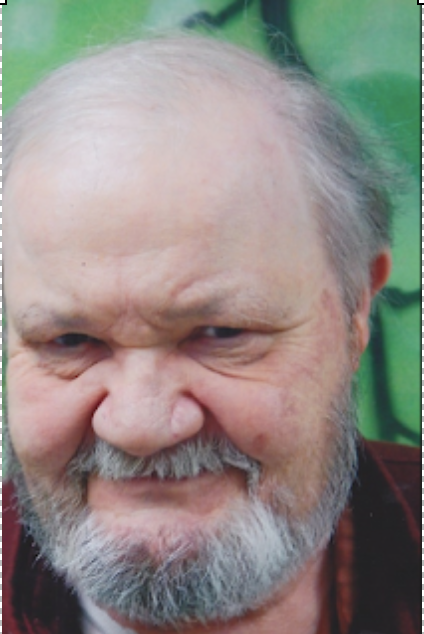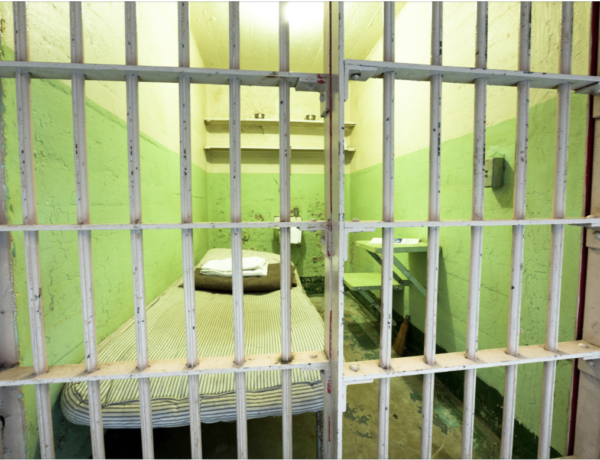Vignette I – The First Day of the Rest of My Life
4:30 a.m., July 20, 2009. My last morning at county prison after a fifteen-month stay. I’m given a paper-bagged peanut butter and jelly sandwich for breakfast, told to pack the only permitted items – twelve photographs and a Bible. I eat nor drink nothing, unsure when I’ll be allowed to use a toilet. Twenty minutes later, I’m led through darkened, echoing corridors to Intake, to be searched, chained hand and foot, and herded into a small van with six other misfortunates. It’s a forty-mile drive to Graterford State Prison – the real deal – where rifle-toting guards patrol the top of a massive forty-foot-tall concrete perimeter wall festooned with kill-you-dead electric fencing, and the rest of the surly guards not only openly resent your existence, but go out of their way to let you know it.
During the hour trip, we pass fields and streams where I once hunted and fished. Memories whisper enticingly, bid me to stop once more, but on we roll, human cargo en route to a meat warehouse.
Karma is my chauffeur, I realize, not a fellow human who in another life would shoot pool with me – loser buys – invite me home to meet his family, become my friend. Because of my past actions, intentional or not, I have chosen Fate for my designated driver, and must now endure its unexpected swerves, tolerate its perplexing detours, and submit to its headlong rush to Golgotha.
At last, we enter the long drive to the prison; its onion-shaped water tower looms above us, as we stop beneath the shadow of its wall, wait for Charon to usher us through the sally port gate into the anteroom of Hades.
We are dead, myself and my companions, and the afterlife beckons. Against our will, we enter.
Vignette II – Numerology
Inside the bowels of the “beast,” we are unchained, lined against a wall with two dozen inmates from other Pennsylvania counties. We wait nervously, under the stares of hostile guards. One at a time, we’re summoned to the desk of a self-important sergeant, who wouldn’t dare to backtalk most of us in a barroom, but here in his realm is a minor deity. He counts our photographs, leafs through our Bibles, then orders us to select a bright-yellow jumpsuit from an adjoining table. Some have broken zippers; none have pockets; all have passed in apostolic succession from woe-be-gone inmate to unlucky prisoner, each of whom has left in its threadbare fabric a whiff of desperation.
My name is called; I walk to the desk. The sergeant glares at me as if I have rendered him an unforgivable insult, holds up a five-by-seven-inch photo of my oldest daughter and her youngest child smiling at my camera.
“This is one too many – contraband. Tear it up!” he barks, hoping to scent a whiff of rebellion. I rip it in two, drop the pieces in a trash can, tell him with my eyes what my tongue yearns to shout, choose a jumpsuit, and return to the wall.
Time creeps by; no one except us prisoners – and our opinions are not solicited – is in any particular hurry. After a delousing shower, I am fingerprinted, photographed, given socks and underwear, interviewed by a bored psychologist, and assigned a number. And just like that, Mommy’s darling boy, Granny’s treasure, Daddy’s first-born son – that happy, ever-smiling son and grandson – is reduced by bureaucratic shorthand to a mere cipher.
I convert the preceding two letters of my ID to numerals, add them up with the last four numbers, do the old numerology thing. If the total – nine – is a symbol of perfection, then I’m a perfect loser, and utter failure. I silently thank God that my father and grandmother are long dead, unable to witness my degradation. As for my eighty-eight-year-old mother, too bad, I guess. She’ll just have to bear the shame, just as she endured the pain of my birth. After all, it’s said, new beginnings are often quite trying.
Vignette III – Shāh māt?
Built in 1929, Graterford State Prison has not aged gracefully. The roof of each hundred-yard-long block leaks badly; dozens of overflowing five-gallon buckets dot the floors when it rains. Steam pipes hiss and wheeze, clatter and bang like the last rales of a mortally wounded robot. Overworked maintenance workers BandAid wounds that would merit euthanasia were the prison a racehorse.
After everyone is issued clothing and boots, we sit in a basement holding tank for the rest of the day, as the repeat offenders back for another not-so merry-go-round bitch about the new cases they “caught,” as if random arrests and convictions are as contagious as the flu. Others compare the plusses and minuses of the various prisons in which they have stayed – some in neighboring states – as if they were travel writers comparing notes.
Finally, just as we are about to go mad from intermingled boredom and dread, we are each assigned a cell, given brief directions, and cast into the maelstrom with only our common sense and rookie luck for life preservers. I carefully navigate the noisy corridors and shaky catwalks, mindful not to look into anyone’s cell, until I find my forlorn haven for the next three weeks.
I introduce myself to my cellie, who grunts a hello and rolls over, face to the wall. In my storage locker, I discover a crude chess set fabricated from moistened, molded, and left-to-harden toilet paper. Half the pieces are blackened by a pen; the board drawn upon a sheet of cardboard. In an earlier incarnation, I had learned the game from my father, who learned it from his, who – you get the idea. But when I tried to teach my son, he wasn’t interested: video games had snipped the continuity. And now, I find myself in danger of checkmate: Shāh māt, Persian for “the King is dead.”
However, I’m certainly not a king, not even a knight, only a lowly pawn, my life a checkerboard of night and day, my fate dependent upon the skills of an appellate lawyer to finagle my way to the eighth rank, where I can be “promoted,” leave my old cocoon behind and butterfly to freedom.
I lay the pieces back in the closet and flop on my bunk. Tomorrow, a new game begins, and I’ll need to play my best.
Vignette IV – Whom Shall Judge the Judge?
At chow time, the cell doors of each tier open en masse. Random openings throughout the day require a guard and a key. The morning of my second day, as soon as the doors open for breakfast, a vigilante storms into a child molester’s cell, beats him senseless, then calmly strolls away. Two hours later – hey, no big hurry! – both actors are led away in cuffs, one to the “hole,” the other to the infirmary.
A few days later, I come back from lunch to find myself locked out. I sit upon a chained-fast steel picnic table to scan the returning crowd for a familiar face. Several cells down the hall from mine, I see a tall, thin, middle-aged man leaning against the wall. At county prison, he was held in protective custody as a convicted rapist of two prepubescent sisters. When our eyes meet, and he realizes that his anonymity hangs by a thread, and that I hold the scissors, he blanches, looks away.
The judge mounts his lofty bench, regards me without pity. A framed quotation from John Locke – “Wherever law ends, tyranny begins” – hangs behind him on the wall. In chains, unjustly convicted of first-degree murder for an act of self-defense in my own home against a knife-wielding intruder, I read the quotation with ironic disdain, convinced that tyranny is about to be unloosed.
Two months later, sentenced to life without parole, I look at the frightened man, whose safety – possibly his life – depends upon my silence, and am briefly tempted to deliver justice by proxy: spread word of his heinous crimes. But, upon reflection, I reconsider: I am not God, far from it, and I leave him to his karma, whose net is wide, but misses nothing.
Two weeks later, the man is moved to Camp Hill State Prison, where he is outed by a less-reticent man than me, and pummeled into a body cast, resentenced to life in a wheelchair.
And thus, the relentless juggernaut of karma rolls on, fueled by the actions of judge and sinner alike.
Vignette V – Déjà Vu All Over Again
Graterford State Prison is laid out like a comb, with dirt and concrete exercise yards between each tooth/block. Except for ours, the transient block. Outside our windows is a grassy expanse accessible only through the kitchen. Eight years before, a month after 9/11, I worked for a construction company that renovated the same block on which I am now confined, an irony of which I’m all too aware. For two weeks, until I was laid-off, I was paid $38 an hour to help tear off the existing facade, install insulation and replacement windows, and lay up a double layer of block and brick. Then, I was a highly paid mason; now, reduced to mere chattel, I would earn nothing but scorn from my old workmates, if they knew of my plight.
From the window of my ground-level cell, I can see half-hidden shards of old brick in the unmown April grass. Twenty feet away, a female Canada goose has built her nest; every morning when she is briefly off the nest feeding, I check her four eggs, wonder when the goslings will emerge.
A week into my stay, four dandelion-yellow balls of fluff break free during the night, and are soon tumbling behind their mother as she breaks trail through the yard where I had once labored, pecking up bugs, ever-vigilant. Temporary prisoners themselves, unable to fly, my new friends gambol happily amid the beak-high grass, their easy bonhomie a cutting reminder of my own estranged family.
The youngsters grow before my eyes; double in size within a week. Meanwhile, my scheduled “extensive” battery of medical tests completed in three hours, I pray each Sunday night that I will be awakened at 4 a.m. by a guard and told to “Pack your shit – you’re moving out.”
On that lucky day, I intend to crank open my window to wish my sleeping companions goodbye and good luck. They may be free, but the guns of hunters and the teeth of predators await. Then I will pack my meager “shit,” and wonder if my new prison will prove half as dangerous. But until that dearly anticipated morning, I’ll try to emulate the geese, who accept whatever comes and never “sweat the small stuff.”
Vignette VI – Goodbye, Hades; Hello, Hell
Because of a bureaucratic snafu, my three-week stay becomes four; time creeps by in a tedious ordeal of noise and the ever-simmering threat of violence. I have no books, no magazines, nary an outdated sheet of newsprint. I begin to read my Bible, breeze through Genesis, slow down a mite at Deuteronomy, resist the urge to skip to the “good” parts: Ecclesiastes and the Song of Solomon. In its margins, on blank pages, I sketch out the outline for my long-deferred second novel, resurrect characters and voices from long ago.
At last, I am awakened for the move to Camp Hill State Prison. Happy to put this sump pit of misery in my rearview mirror, I drown out the guard’s instructions with fervid hosannas of gratitude.
Chained and shackled, barely able to scratch our noses – and forget about using a handkerchief, which we don’t have, anyway – forty of us are loaded onto a bus for a scenic two-hour trip across the southeastern third of the state. As we rumble down the drive, two summer-red deer watch us pass. Soon, they will bed down for the day, but I have miles to go before I sleep, in a forest of concrete and steel.
Once again, we pass the backdrops of my previous life: bars and stores and a foundry where I endured three days of August heat before sneaking off to a favorite swimming hole. We go by a farmer’s market where I witnessed a ninety-two-year-old strongman – “The Mighty Atom” – bend horseshoes in his bare hands, while preaching the virtues of clean-living and sobriety, advice I ignored to my subsequent regret.
The bus passes houses I once stuccoed, the Morgantown ballfield – only eight miles from my home – where teenage me had played American Legion Baseball. In 1965, I was an All-County shortstop, the star of the annual All-Star game. Now, I’m a pariah, an utter failure, a sad has-been who committed a losing error, just another weight around the taxpayers’ ankles.
We enter the turnpike, roll on towards Harrisburg. Thirty years ago, I had traveled it every day, pipelining in the hills above Three Mile Island. After its partial meltdown, I eyed the reactor’s ominous cooling towers, wondering if a radiation cloud was about to fry my chromosomes and implant a future dose of cancer. Now, as we stop before the gate of Camp Hill, I remember the deadly riots of a few years past, and forget about ancient bugbears: the future is NOW!
The gate swings open for the Golden Boy of Summer and his chums, and we enter.





No Comments